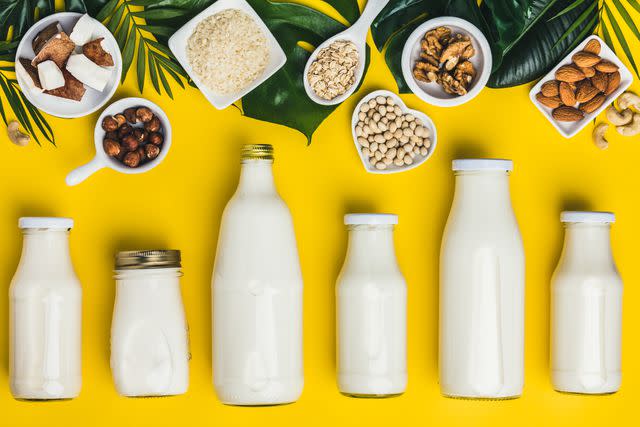After a Lengthy Debate, Soy and Nut Milks Can Officially Be Called 'Milk,' FDA Says
In case there was any confusion...
Whether your go-to is almond milk, cashew milk, or something a little fancy like macadamia milk, there’s no denying the popularity of nut- and plant-based milks these days. These plant-based alternatives to dairy milk are great in smoothies and frothed-up lattes. However, there has been some controversy in recent years as to whether or not these products should be labeled as “milk” or as something else. For example, if you’re a Trader Joe’s shopper, you might have noticed the store’s almond milk is labeled “Almond Beverage.”
But have you ever really confused plant-based milk and cow’s milk? While the difference may be pretty obvious to most of us, the FDA wasn't always so sure.
Related:Love Almond Milk? 7 Healthy Reasons to Keep Sipping on This Non-Dairy Drink
What Exactly Is Milk?
Way back in 1973, the FDA defined milk as “the lacteal secretion, practically free from colostrum, obtained by the complete milking of one or more healthy cows.”
If you were curious, colostrum is the milky fluid produced by mammals (so cows, humans, goats, and even camels) shortly after birth before the body starts to fully produce milk.

Natalia Klenova/Getty Images
The Milk Industry Starts to Sour
By 2010, sales of plant- and nut-based drinks such as soy milk, almond milk, and rice milk started to increase, with one-fifth of households in the United States opting for cow’s milk alternatives.
But by 2016, this number notably went up, when other kinds of milk took a third of the market share. With $1.5 billion in annual sales, the dairy industry started to take notice.
Related:Wait a Minute, Is Milk More Hydrating Than Water? Here's the Best Time to Swap Water for Milk
The FDA Intervenes
By 2018, Scott Gottlieb, who was the FDA Commissioner at the time, made a statement concluding that plant- and nut-based milk technically didn’t fall within the government’s definition of milk.
Later that year, the FDA issued a notice entitled “Use of the Names of Dairy Foods in the Labeling of Plant-Based Products,” asking for consumer input on the milk labeling conundrum as well as conducting focus groups to give them further guidance on this issue.
The FDA Issues New Guidelines
After years of conducting this research, the FDA issued new guidelines in February 2023 on the labeling of milk, stating that all your favorite milk alternatives, whether it’s oat milk, hemp milk, or even coconut milk, can in fact be called “milk.”
However, under the draft of these new guidelines, the FDA recommends that products are clearly labeled. In other words, you can’t label a carton of pea milk as “milk” without mentioning that it’s pea-based.
The FDA is also calling for voluntary labeling to state if beverages have lower nutrient levels than dairy milk, such as how much calcium,vitamin D, and magnesium these alternative milks provide. Labels can also state if plant-based milks have higher nutrient levels.
The Cows Are Alright
While this entire process may lead you to believe that the dairy industry was having trouble staying afloat, rest assured, it is doing just fine. According to NielsenIQ, most households still drink cow's milk. Between January 2022 to January 2023, sales reached $12.3 billion, while sales for nondairy milk were just $2.5 billion.
For more Real Simple news, make sure to sign up for our newsletter!
Read the original article on Real Simple.


